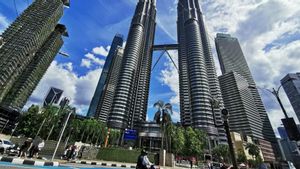JAKARTA - Attorney General Sanitiar Burhanuddin has his own concept of thinking about handling corruption cases with relatively small losses or under Rp 50 million. Listen carefully to his thoughts.
This was conveyed by Burhanuddin when he was a keynote speaker in a public discussion themed “Restorative Justice: Does Rp50 million of Corruption Need to be Imprisoned?”, in Jakarta, Tuesday, March 8.
Burhanuddin gave an example of a corruption case, for example in eastern Indonesia. For example, in archipelagic areas, the examination and trial processes must be carried out by land, sea, and air as well as to reach the provincial capital in order to hear cases of small-scale corruption crimes.
He said, the operational costs incurred were not in accordance with the state losses to be saved.
"The handling of small-scale corruption cases is also not an achievement to be proud of, and sometimes it tends to be unacceptable to the public," he explained as quoted by Antara.
The Attorney General's Office strives for criminal acts of corruption with small losses to be applied with restorative justice. The Prosecutor's Office has issued Prosecutors' Regulation Number 15 of 2020 concerning Termination of Prosecution Based on Restorative Justice, which was promulgated on 22 July 2020. This Prosecutor's Regulation Number 15 of 2020 is the first regulation under a law that applies the principle of restorative justice.
In the context of eradicating corruption, it is possible that the application of restorative justice can be applied to perpetrators of corruption whose actions are not related to state financial losses or related to state financial losses, but with a small nominal loss.
"Everyone has the right to get legal justice, so legal justice cannot be given only to certain groups. This is of course while still paying attention to the quality, type, and severity of a case. With the principle of justice for all and law for humans, "explained Burhanuddin.
According to him, corruption is basically a financial crime, so that it will be more appropriate to tackle it if the approach uses financial instruments.
The approaches to financial instruments that have been carried out so far include changing the approach pattern from follow the suspect to follow the money and follow the assets, impoverishing corruptors by confiscation of corruptors' assets through asset tracing in order to recover state financial losses, so that law enforcement is not just criminalizing corporate bodies. , but also how the state's financial losses can be recovered to the fullest.
Then, file a civil lawsuit against the perpetrator who has died or been released, but in fact there has been a loss of state finances.
Through the approach of financial instruments, Burhanuddin continued, the process of eradicating criminal acts of corruption needs to consider the state's economic burden for the costs of the law enforcement process, including the cost of living and fostering prisoners after the inkracht decision.
"This is in line with the theory of economisc analysis of law which is currently starting to develop," he said.
This theory explains that in order to create an efficient law enforcement process, it must consider the nationality of the calculation of the cost of handling corruption cases from the start of the investigation to the implementation of the inkracht decision so that the state does not experience an increase in the number of state financial losses due to acts of corruption that have been committed by the perpetrators. costs of handling cases carried out by law enforcement officers.
This theory, said Burhanuddin, is in line with the concept of restorative justice in realizing a simple, fast and low-cost justice system that can save the budget.
"By calculating the budget carefully, law enforcement officers can focus more on major corruption cases, which require large operational costs," he said.
Regarding criminal acts of corruption that are not related to state financial losses, as well as those related to state financial losses with a relatively small nominal loss, for example under Rp. 50 million, Burhanuddin said that it should be a subject of joint discussion, whether the case must be subject to criminal sanctions or can be subject to criminal sanctions. using other sanctioning mechanisms.
"For example, the corruption that occurred in Pontianak City in the case of illegal levies or extortion with a value of Rp. 2.2 million. Should the extortion case be processed and tried with the legal mechanism of corruption? This is a question for us," he said.
He further said that public trust in law enforcement could actually decrease because the quality of case handling carried out was only at the "anchovy level" and it was considered that law enforcement officers were unable to fight corruptors on a big fish scale.
Another thing that needs to be understood, he continued, is to equate a corruption case of Rp. 50 million with the theft of Rp. 5 million. These two cases are not the same or not apple to apple. The corruption case is a special crime that has a more complex mechanism and requires high costs, and the party that is harmed is the state.
He also said that basically the state as a victim has the capacity to punish perpetrators, namely by using other mechanisms or instruments outside of prison sanctions, of course an instrument that has principles of justice, but is economical because the state actually loses more if it has to punish the perpetrators to go to prison.
"If this continues to be enforced, the community will indirectly become secondary victims, because state money that should be channeled to the welfare of the community can be drained only for anchovy-level corruption cases," said Burhanuddin.
Burhanuddin added that the imposition of criminal sanctions, especially imprisonment, is not an attempt to retaliate, but a process of correctional education and deterrence which aims to make the perpetrators aware of their mistakes, so that sentencing is a last resort.
Criminal sanctions do not always have to be imprisonment. There are several other sanctions that can be applied by the perpetrators of the “anchovy class” corruption crime, for example by criminal sanctions that are appropriate, revocation of certain rights, or confiscation of goods.
The Prosecutor's Office can also provide recommendations to relevant stakeholders to provide administrative sanctions for personnel, for example, postponement of rank to dismissal. In addition, for the private sector, freezing, dissolution, or blacklisting can be carried out so that they can no longer participate in the procurement of state-owned goods and services.
"Imposing criminal sanctions appropriately and according to portions is a wise step in swinging the sword of justice," said Burhanuddin.
The English, Chinese, Japanese, Arabic, and French versions are automatically generated by the AI. So there may still be inaccuracies in translating, please always see Indonesian as our main language. (system supported by DigitalSiber.id)











